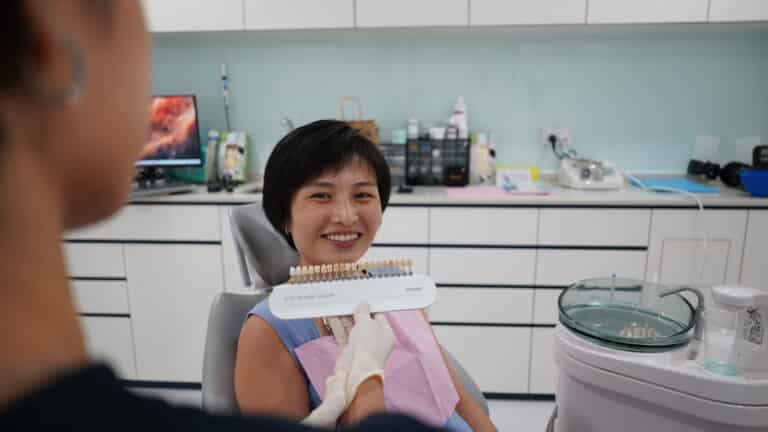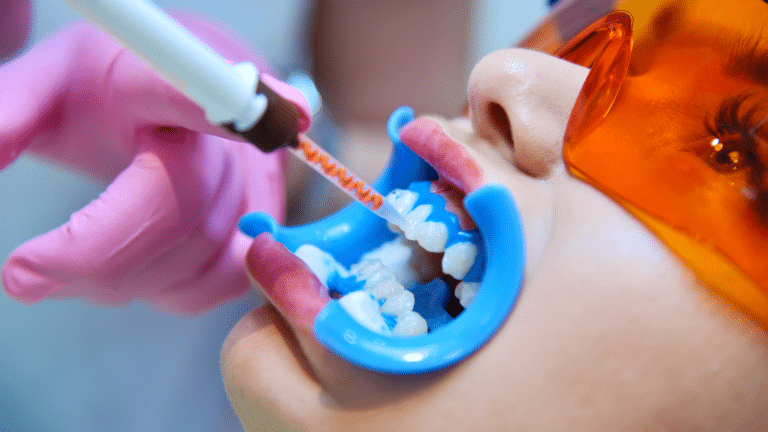Getting dental implants is one of the most reliable ways to replace missing teeth — but one of the most common questions patients ask is: “How long do dental implants take to heal?”
At WeSmile Dental, we understand that knowing what to expect before, during, and after treatment helps patients feel at ease. Healing time can vary for each person, but with the right preparation, care, and follow-up, most patients enjoy smooth recovery and lasting results.
In this guide, we’ll explain the stages of healing after dental implant surgery, what affects recovery, and how you can support proper healing for a stronger, natural-looking smile.
First, what happens during a dental implant procedure?
A dental implant is a titanium post surgically placed into your jawbone to replace a missing tooth root. Once inserted, it serves as a sturdy foundation for a custom crown, bridge, or denture.
Every implant has three parts:
| Dental Implant Component | Purpose | Analogy |
|---|---|---|
| Implant post | Anchors into the jawbone like a root | Foundation of a building |
| Abutment | Connector between implant and crown | Bridge link |
| Crown | The visible replacement tooth | The finished façade |
The full procedure involves several stages — placement, healing, and crown attachment — each requiring time for your body to heal and adapt.
So, how long do dental implants take to heal?
On average, dental implants take about three to six months to fully heal, although the exact duration can vary for each person. This period allows your jawbone to naturally fuse with the implant post in a process known as osseointegration — the foundation that ensures long-term stability and success of your implant.

Healing time can differ based on factors such as:
- Your general health and lifestyle habits (e.g., smoking, diabetes, or nutritional deficiencies can slow recovery)
- Bone density and quality, which affect how well the implant integrates
- Your oral hygiene routine and adherence to post-surgery care instructions
Some individuals may heal within a few months, while others — especially those who’ve had bone grafting or sinus lift procedures — may require a longer integration period before the final crown can be placed.
Let’s take a closer look at each stage of the healing journey.
Stage 1: Initial healing (first 1–2 weeks)
Immediately after your dental implant surgery, your gums begin the soft tissue healing process. It’s common to experience:
- Mild swelling, soreness, or tenderness around the implant area
- Slight bruising of the gums or cheek
- Minor bleeding within the first 24–48 hours
During this stage, your body works to close the incision and protect the implant site. Soft tissue recovery occurs as your gum tissue gradually seals around the implant, creating a healthy environment for bone healing to follow.
Stitches are typically removed — or dissolve naturally — within one to two weeks, depending on the surgical technique used.
🦷 Tip: Maintain gentle but consistent oral hygiene. Rinse with an antibacterial mouthwash (if prescribed), avoid smoking or drinking through a straw, and refrain from putting pressure on the implant area until your dentist advises otherwise.
Stage 2: Bone integration (3–6 months)
This is the most crucial part of the implant healing journey — when your jawbone fuses with the titanium post through osseointegration. This biological process creates a strong, stable foundation for your future dental crown.
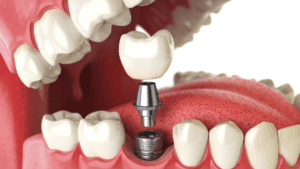
Typically, this stage lasts three to six months, although it can vary depending on your bone quality and overall health. During this period, your dentist may:
- Conduct periodic review appointments to monitor bone integration using X-rays or clinical assessments
- Provide a temporary crown or bridge to maintain the appearance and function of your smile while healing continues
It’s important to avoid chewing hard foods directly on the implant site during this phase to prevent unnecessary stress on the bone and implant.
🦷 Tip: Consistent follow-ups with your dentist help ensure that osseointegration is progressing properly and that your implant remains stable.
Stage 3: Crown placement (after full integration)
Once the implant has completely fused with your jawbone, the final stage begins. A small connector piece called an abutment is attached to the implant post, which will serve as the base for your permanent dental crown.
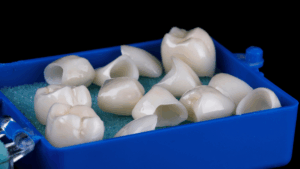
Your dentist will then take an impression or digital scan of your mouth to design a custom-made crown that matches your natural teeth in colour, shape, and size. Once fitted, it restores both the look and function of your smile.
This stage usually involves minimal healing — just a few days for the surrounding gum tissue to adapt to the new restoration.
🦷 Tip: Continue practising good oral hygiene and attend regular dental check-ups to maintain the health and longevity of your implant.
What affects how long dental implants take to heal?
Every mouth is unique, and so is every healing process. Here are some key factors that influence how long your dental implants take to heal:
| Factor | Impact on Healing | WeSmile Dental’s Approach |
|---|---|---|
| Bone density | Lower bone density may slow fusion | Pre-assessment & bone grafting if needed |
| Gum health | Untreated gum disease can delay healing | Comprehensive gum therapy before placement |
| Smoking | Reduces blood flow, slows recovery | Advice on quitting before and after surgery |
| Medical conditions | Diabetes or immune issues may affect healing | Coordination with your GP for safe care |
| Oral hygiene | Plaque buildup risks infection | Tailored cleaning instructions and reviews |
At WeSmile Dental, your implant journey is always customised. Our dentists take every precaution to ensure healing happens safely and efficiently.
Do dental implants feel natural once healed?
Yes — once fully integrated, dental implants feel natural. Because they bond directly to your bone, they replicate the sensation and stability of real teeth.
You’ll be able to:
- Bite and chew without discomfort
- Speak clearly without slurring
- Smile confidently knowing your tooth looks real
At WeSmile Dental, every crown is custom-shaded to match your natural teeth, ensuring seamless results that not only look natural but also feel like part of you.
Does healing time affect dental implant cost in Singapore?
Yes, indirectly. The dental implant cost in Singapore depends partly on the complexity of your treatment and the number of visits required.
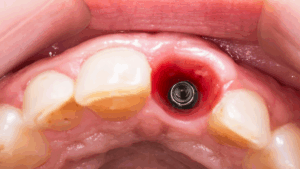
If bone grafting or sinus lift procedures are needed to support healing, these can influence total costs and recovery time. However, at WeSmile Dental, your dentist will explain every stage of your plan upfront so you know exactly what to expect — no hidden charges.
| Influencing Factor | Impact on Cost & Healing |
|---|---|
| Type of implant system | Advanced systems may shorten healing time |
| Bone graft or sinus lift | Adds preparation time for integration |
| Surgical precision | Modern digital planning improves predictability |
| Follow-up care | Ensures stable, long-term results |
How to support faster healing after dental implant surgery
Healing is not just about time — it’s about care. Here are practical ways to support a smoother and quicker recovery:
- Follow your dentist’s aftercare instructions carefully.
- Avoid smoking and alcohol, as they slow down tissue regeneration.
- Eat soft foods like soups, yoghurt, and mashed vegetables for the first few days.
- Stay hydrated to promote healthy circulation.
- Maintain good oral hygiene, gently brushing around the area without disturbing stitches.
- Attend all review appointments — they’re crucial for monitoring bone integration.
What if healing takes longer than expected?
Occasionally, dental implants may take longer to heal due to bone density, infection, or systemic conditions.
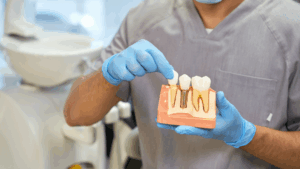
Don’t worry — this doesn’t mean the implant will fail. Your dentist may simply extend your healing phase or recommend additional care to support integration.
At WeSmile Dental, we monitor your progress through digital imaging and professional check-ups, ensuring every step is safe and predictable.
Dental implants at WeSmile Dental
At WeSmile Dental, every dental implant journey is guided by precision, compassion, and care. Our dentists use diagnostic imaging and minimally invasive techniques to ensure comfort at every step.
Whether you’re replacing a single tooth or restoring your entire smile, we tailor each treatment plan to your needs and lifestyle. From consultation to aftercare, you’re supported by an experienced team committed to your wellbeing.
✨ Book your consultation today to explore how dental implants can restore your smile with confidence and comfort.
Frequently Asked Questions on Dental Implants
1. Do dental implants last forever?
Not exactly, but with good oral hygiene and regular check-ups, dental implants can last for decades. The titanium post integrates permanently with your bone, while the crown may need replacement over time due to normal wear.
2. Can I get dental implants if I smoke?
Smoking slows healing and increases the risk of implant failure. It’s best to quit or reduce smoking before and after your procedure to improve recovery and success rates.
3. Are dental implants painful?
The procedure is done under local anaesthesia, so you’ll feel minimal discomfort. Most patients describe the recovery as mild — often easier than a tooth extraction — and manage it well with prescribed or over-the-counter pain relief.
4. Can dental implants replace multiple missing teeth?
Yes. Implants can support individual crowns, bridges, or full-arch dentures, depending on your needs and bone condition. Your dentist will recommend the most suitable option for you.
5. How much do dental implants cost—and are they worth it?
At WeSmile Dental, implant treatment starts from about S$3,052 per tooth (including crown), with full-arch or multi-tooth options also available.
While implants cost more upfront than dentures or bridges, they’re a long-term investment that helps preserve bone, restore confidence, and last for many years with proper care.

